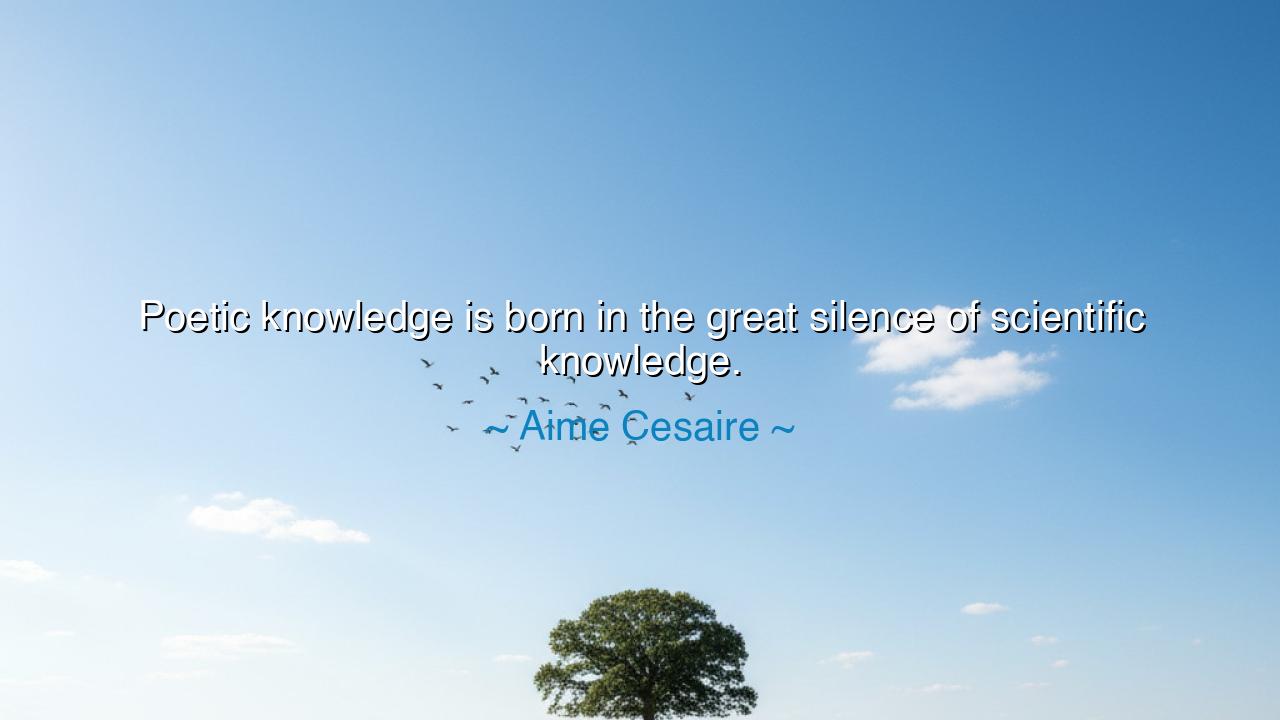
Poetic knowledge is born in the great silence of scientific






“Poetic knowledge is born in the great silence of scientific knowledge.” — Aimé Césaire
In these luminous words, Aimé Césaire, the poet of Martinique and father of Négritude, unveils a truth as deep as creation itself—that when the voice of science grows still, another voice awakens, the voice of poetry. The one dissects, measures, and names; the other feels, dreams, and sings. Where scientific knowledge seeks to explain the world, poetic knowledge seeks to experience it. It is born, Césaire tells us, in the silence left behind when the mind’s instruments have reached their limit—when the microscope has seen all it can, and the telescope can gaze no further. Beyond that frontier, the heart begins to speak.
Césaire was both a poet and a thinker, a man who understood that progress in science did not always mean progress in spirit. In an age when reason reigned supreme, he called his people—and indeed, all humanity—back to the realm of wonder and imagination. He saw that the great silence of scientific knowledge was not emptiness, but space: the sacred pause where the soul could breathe again. For science gives us precision, but poetry gives us meaning. Science tells us what the stars are made of; poetry tells us why they make us tremble. And when science grows silent before the mysteries it cannot measure, it is then that poetic knowledge is born—the knowledge of awe, of beauty, of the infinite.
To understand Césaire’s vision, we must see his world. Born in a time when colonization had crushed the dignity of his people, he used poetry as a weapon of liberation. The colonial mind prided itself on scientific knowledge—on the logic of conquest, the charts of empire, the cataloguing of lands and peoples. But Césaire saw through this illusion. He declared that a world explained only by science was a world stripped of soul. What science called “progress,” he saw as spiritual exile. So he turned to poetry, that ancient language of the heart, to restore what numbers had erased: the human mystery, the divine rhythm in nature, the sacred fire in man.
Consider, then, the story of Albert Einstein, who stood at the edge of science and beheld the universe with both awe and humility. Though his equations unlocked the secrets of light and gravity, he confessed, “The most beautiful thing we can experience is the mysterious.” In that confession lies the echo of Césaire’s truth: when scientific knowledge grows quiet—when it admits its own limits—something greater stirs. The poet within the scientist awakens, and knowledge becomes wonder. Einstein, like Césaire, knew that discovery without reverence is empty, and that the silence beyond reason is not ignorance—it is the birthplace of wisdom.
For poetic knowledge is not opposed to science; it completes it. Science gives us tools, but poetry gives us purpose. Science shows us how things work, but poetry reminds us why they matter. The silence between them is not a barrier, but a threshold. It is in that silence that man learns to see the world not as a collection of objects, but as a communion of souls. The river is no longer a chemical stream; it becomes a living hymn. The tree is not merely carbon and chlorophyll; it is an ancient being whispering to the sky. Such seeing is not learned in laboratories, but in the quiet places of the spirit, where the heart listens for truths too vast for language.
Césaire’s wisdom, then, is a call to balance. He does not reject scientific knowledge—he honors it—but he reminds us that it is incomplete without the poetic. A civilization that knows how to build machines but not how to dream will become powerful yet soulless. To cultivate poetic knowledge is to remember the sacred dimension of life, to restore meaning to progress and humanity to intellect. The scientist measures the light; the poet becomes it. The scientist studies the seas; the poet hears the ocean’s eternal song. Both are seekers, but only together do they complete the circle of understanding.
So, dear listener, when the noise of analysis grows too loud, seek the great silence. Walk beneath the stars without asking for their names. Listen to the wind without needing to chart its speed. Feel the earth, the rhythm, the pulse of things unseen. Let poetic knowledge awaken in you—the knowledge that humbles, heals, and unites. For when the instruments of reason fall quiet, and the heart begins to listen again, you will find yourself standing where Césaire once stood: between heaven and earth, in that vast and sacred silence where knowledge becomes love, and the world once more becomes holy.






AAdministratorAdministrator
Welcome, honored guests. Please leave a comment, we will respond soon